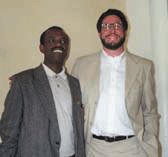Neurologist Tries to Build Residency in Ethiopia
In Ethiopia, a nation of 61 million people deeply mired in poverty and war, mental health care does not assume a prominent place on the national agenda. Limited resources must be spread across staggering medical and social needs. But in this nation where progress is made in extremely small steps, the medical school is about to get its first psychiatry residency program, thanks to a Philadelphia neurologist.
Robert Winer, M.D., who heads a foundation that bears his name, has been doing humanitarian work in Ethiopia since 1993, primarily among the country’s remaining Jewish population who have not yet been able to emigrate to Israel. During a trip to Ethiopia last spring, Winer was able to spend time teaching at the Addis Ababa University School of Medicine in the Ethiopian capital.
Seeing a desperate need for more psychiatrists and neurologists, he established the Medical Initiative for Ethiopia, a primary goal of which is to boost the number of psychiatrists in the country. As of last year, he noted, there were only 10 psychiatrists to tend to the mental health care needs of the 61 million Ethiopians. (As of last month the number of psychiatrists was down to nine.)
To accomplish this, Winer has partnered with the medical school at Addis Ababa University, which has been trying to establish a psychiatry residency program. Future psychiatrists must now go to another country for training, and many of them do not return to their homeland once they complete their residency.

Robert Winer, M.D. (right), poses with Atalay Alem, M.D., who is an assistant professor of psychiatry at Addis Ababa University School of Medicine. Winer established the Medical Initiative for Ethiopia in hopes of increasing the number of psychiatrists in that country.
Winer said that what is most needed to begin a psychiatry residency program at the Addis Ababa University “is a fund for books, journals, Internet access and a computer, stationery, furniture, travel to train and interface with psychiatric nurses already providing some care throughout Ethiopia, and some treatment-room remodeling” to include one-way mirrors. He also said the funds will go to purchase audio and video equipment for the training program and to bring psychiatric nurses to Addis Ababa for additional training.
Once the program is ready to begin its training mission, the psychiatrists staffing it will need input from colleagues from other countries. “We have government approval for the program and psychiatrists willing to staff it,” Winer told Psychiatric News. He said he is “committed to helping raise funds to train four to six psychiatry residents per year over a three-year training program.”
One step toward building a program is already under way, Winer pointed out, now that a group of psychoanalysts in Pittsburgh who read an article in their district branch newsletter about his efforts have gathered a library of psychiatric books to send to the medical school. John Hitchcock, M.D., is coordinating the effort, Winer noted, and the foundation is in the process of raising funds to ship the collection to Ethiopia.
Alem is working with Winer to meet the goals necessary to make the psychiatry residency program a reality.
“What shocks me,” Winer said, “is that so many times we physicians minimize the impact we can have or believe we lack the stature or expertise to do something internationally. But psychiatrists can contribute significantly to improving the care in Ethiopia for years to come. They have years of clinical experience and the ability to convey their knowledge.”
Winer is hoping psychiatrists volunteer to participate in the visiting psychiatrist program his foundation has established and is raising funds to make these visits possible.
The foundation’s fundraising target for the psychiatry effort in Ethiopia is $45,000. Noting that this is a relatively modest sum, Winer pointed out that “money goes a long way in a poor country like Ethiopia.”
He told Psychiatric News that his hopes are high that the project will succeed. “I’d like to have all the money we need tomorrow, but I realize it takes time for people to hear the message and to present what you are doing. I believe this program will sell itself once people have heard about it,” Winer said.
Information about the Ethiopia initiative is available on the foundation’s Web site at www.gesher.org/Humanitarian%20Work/Background.html. ▪



